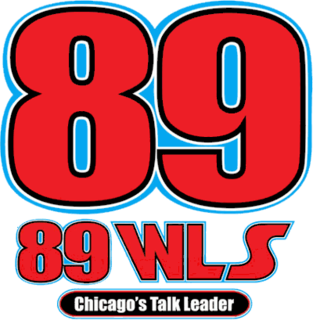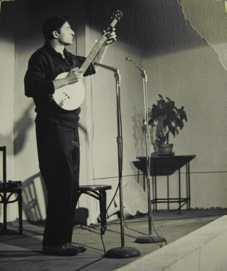Related Research Articles

William Smith Monroe was an American mandolinist, singer, and songwriter, who created the bluegrass music genre. Because of this, he is often called the "Father of Bluegrass".

WLS is a commercial AM radio station in Chicago, Illinois. Owned by Cumulus Media, through licensee Radio License Holdings LLC, the station airs a talk radio format. WLS has its radio studios in the NBC Tower on North Columbus Drive in the city's Streeterville neighborhood. Its non-directional broadcast tower is located on the southern edge of Tinley Park, Illinois.

Hoagland Howard Carmichael was an American musician, composer, songwriter, actor and lawyer. Carmichael was one of the most successful Tin Pan Alley songwriters of the 1930s, and was among the first singer-songwriters in the age of mass media to utilize new communication technologies such as television, electronic microphones, and sound recordings.

John Cowan Hartford was an American folk, country, and bluegrass composer and musician known for his mastery of the fiddle and banjo, as well as for his witty lyrics, unique vocal style, and extensive knowledge of Mississippi River lore. His most successful song is "Gentle on My Mind", which won three Grammy Awards and was listed in "BMI's Top 100 Songs of the Century". Hartford performed with a variety of ensembles throughout his career, and is perhaps best known for his solo performances where he would interchange the guitar, banjo, and fiddle from song to song. He also invented his own shuffle tap dance move, and clogged on an amplified piece of plywood while he played and sang.
William Bradley Kincaid was an American folk singer and radio entertainer.

Anthology of American Folk Music is a three-album compilation, released in 1952 by Folkways Records, of eighty-four recordings of American folk, blues and country music made and issued from 1926 to 1933 by a variety of performers. The album was compiled from experimental film maker Harry Smith's own personal collection of 78 rpm records.

Moran Lee "Dock" Boggs was an American old-time singer, songwriter and banjo player. His style of banjo playing, as well as his singing, is considered a unique combination of Appalachian folk music and African-American blues. Contemporary folk musicians and performers consider him a seminal figure, at least in part because of the appearance of two of his recordings from the 1920s, "Sugar Baby" and "Country Blues", on Harry Smith's 1952 collection Anthology of American Folk Music. Boggs was first recorded in 1927 and again in 1929, although he worked primarily as a coal miner for most of his life.
Captain Stubby and the Buccaneers was a country-comedy band that performed largely in the Midwest United States from the late 1930s into the 1960s.

Louis Marshall Jones, known professionally as Grandpa Jones, was an American banjo player and "old time" country and gospel music singer. He is a member of the Country Music Hall of Fame.
"Frog Went a-Courtin'" is an English-language folk song. Its first known appearance is in Wedderburn's Complaynt of Scotland (1549) under the name "The Frog cam to the Myl dur", though this is in Scots rather than English. There is a reference in the London Company of Stationers' Register of 1580 to "A Moste Strange Weddinge of the Frogge and the Mouse." There are many texts of the ballad; however the oldest known musical version is in Thomas Ravenscroft's Melismata in 1611.

Appalachian music is the music of the region of Appalachia in the Eastern United States. Traditional Appalachian music is derived from various influences, including the ballads, hymns and fiddle music of the British Isles, the African music and blues of early African Americans, and to a lesser extent the music of Continental Europe.

The Hoosier Hot Shots were an American quartet of musicians who entertained on stage, screen, radio, and records from the mid-1930s into the 1970s. The group formed in Indiana where they performed on local radio before moving to Chicago and a nationwide broadcasting and recording career. The group later moved to Hollywood to star in western movies.
Stephen Wade is an American folk musician, writer, and researcher.

Carrots/KKKKK is a split record between Excepter and Animal Collective member Panda Bear. It was limited to 1,000 copies. This is Panda Bear's third single for his 2007 album Person Pitch.

Fleming Brown, born in Marshall, Missouri, United States, was an American banjo player and one of the early teachers at Chicago's Old Town School of Folk Music. As an artist, Brown specialized in traditional songs of the Southern Appalachians. He was influenced by old-time banjo players such as Uncle Dave Macon and Dock Boggs. Brown supported himself as a graphic artist and as such never performed widely outside of Chicago.
DeWitt "Snuffy" Jenkins was an American old time banjo player and an early proponent of the three-finger banjo style.
Jesse Donald "Uncle Jimmy" Thompson was an American old-time fiddle player and singer-songwriter. He is best remembered as the first performer to play on Nashville's Grand Ole Opry, appearing with founder and host George D. Hay on the evening of November 28, 1925. The positive response generated by Thompson's performance would be an important influence on the show's creative direction in its formative years. While Thompson made only a handful of recordings late in his life, his cantankerous and eccentric personality and his fiddle skills have made him one of the best-known icons of early country music.
Humphrey Bate was an American harmonica player and string band leader. He was the first musician to play old-time music on Nashville-area radio. Bate and his band, which had been given the name "Dr. Humphrey Bate & His Possum Hunters" by Opry founder George D. Hay, were regulars on the Grand Ole Opry until Bate's death in 1936. The band's recordings, while scant, are considered some of the most distinctive and complex string band compositions in the old-time genre.
Lily May Ledford was an American clawhammer banjo and fiddle player. After gaining regional radio fame in the late 1930s as head of the Coon Creek Girls, one of the first all-female string bands to appear on radio, Ledford went on to gain national renown as a solo artist during the American folk music revival of the 1960s. In 1985, she was awarded a National Heritage Fellowship.

Zeke Clements was an American country musician often dressed in a Western outfit. He was known as "The Dixie Yodeler."